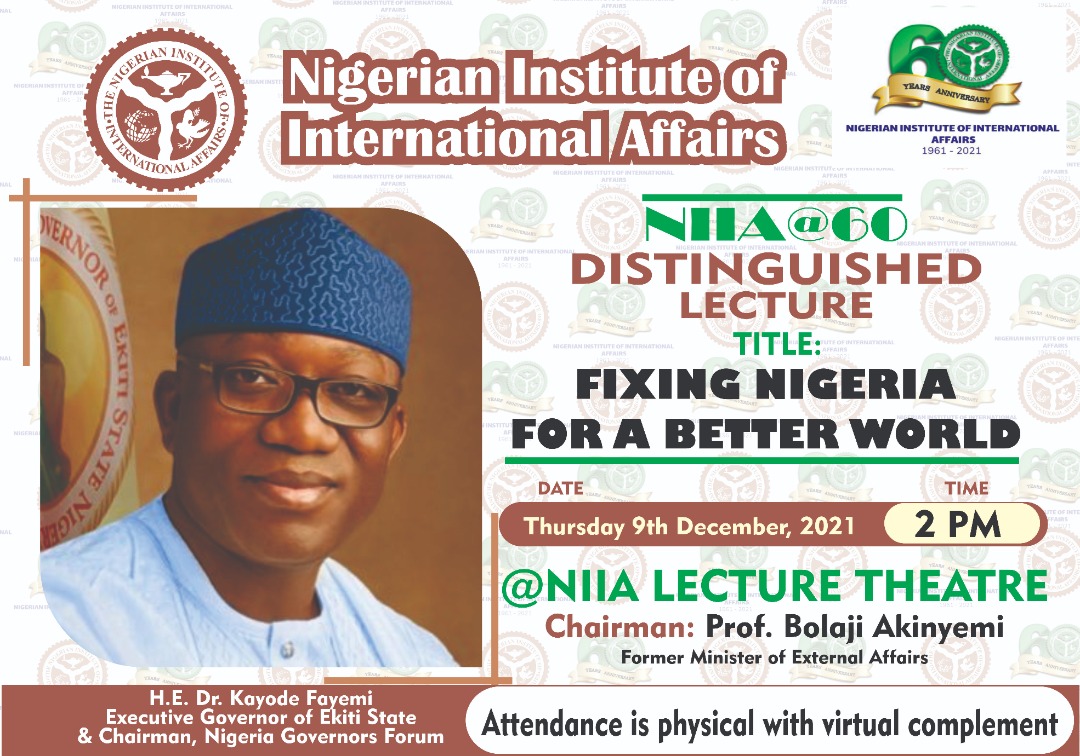The Nigerian Institute of International Affairs, (NIIA) appears set to reverse the historical trend whereby members of the intelligentsia who operate in the spaces for articulating the Nigerian State – the media, academia, think tanks, books and in the policy mill – either do not do enough of it or do so more from platforms that are a part of different understanding of Nigeria already. Thus while members of the intelligentsia think nothing of it in flocking to Chatham House in London or similar platforms, state owned think tanks are left without funding and with inappropriate heads. Though a welcome idea to float ideas in as many platforms as possible, platforms are not innocent players in international politics. The signpost that NIIA might have decided to make itself an attractive platform for the articulation of Nigeria by her elite is what many would see in Thursday, December 9th, 2021 appearance of Dr. Kayode Fayemi to deliver ‘NIIA at 60’ Lecture.
Dr. Fayemi is the governor of Ekiti State in Southwest Nigeria. A product of the Department of War Studies at the King’s College London, Fayemi had been expected to be a powerful voice in the articulation of Nigeria. Somehow, he has not been heard much articulating any grand ideas, practices or models.
It is either he has come to terms with that responsibility which goes with his intellectual processing and is utilizing the ‘NIIA AT 60’ opening or the dynamics in Nigeria have forced it upon him. At the Thursday lecture, he would be speaking on “Fixing Nigeria for a Better World”
Interestingly, Prof Bolaji Akinyemi, a former and unarguably the most successful and most professional head of the think tank is chairing the partially on and off site event. It is not clear if the obviously revamped NIIA is making this its regular feature or just a once-upon-a-time kind of show.
Whether once-a-while or regular show, the appearance has its significance. Nigeria is, indeed, real or a reality but Nigeria as a spot in global space hasn’t got a fixed, universal meaning. The understanding of Nigeria in the White House is not the same as in Ghana nor is Downing Street’s understanding of Nigeria the same as Elysee Palace in Paris.
This being the case means that Nigeria, like all other entities, is a textual entity, a kind of an open book which is acted upon the way it is ‘read’ and understood. And that the struggle for the soul of Nigeria lies not necessarily in industrialization, military capability, demographic power or so in themselves but, first and foremost, in how Nigeria itself is framed or whose voice is the loudest in the endlessly shifting framing of Nigeria.
Historically, however, the intelligentsia whose job is to fight this framing war are themselves too divided at home to project a nationalist framing of Nigeria or the role of discursive power in global politics escapes their horizon. The end result is the ‘preponderance of negativity’ that shapes the narrativisation of Nigeria. That happens because the job of narrating Nigeria is left to those whose cultural lens can only see Nigeria in a particular way.
However, the ‘preponderance of negativity’ embody a performative outcome, meaning that the negative references to Nigeria are complicit in the real, ugly Nigeria that we see, shout and complain about!
If only this, then NIIA shows Nigeria why it must have have well developed universities which can produce culturally informed theories of Nigeria rather than geopolitically interested analyses. Discursive power is the new oil in world politics. The way a country is framed can determine how fast it industrialises or steps back from it, for example.




























